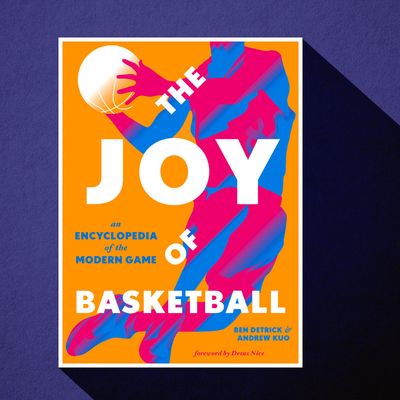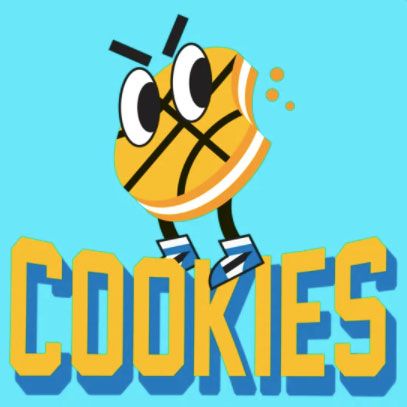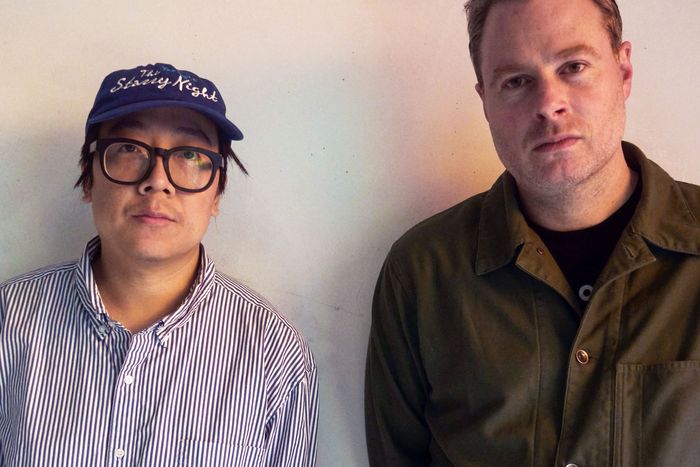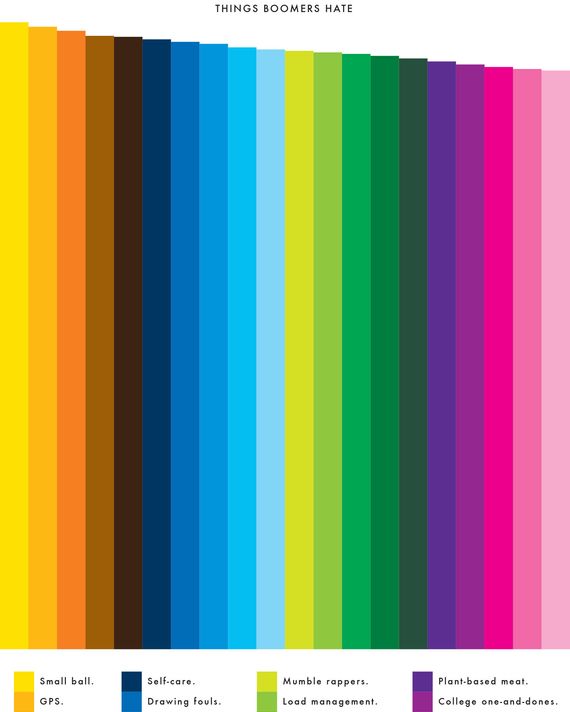
Ben Detrick and Andrew Kuo are not your average sports talk-radio duo. A writer and a painter respectively, they also self-identify as “nightlife guys” who met “casually by fate” partying in the Lower East Side in the 2000s, at bars and clubs like Max Fish and Lit, where Kuo was a DJ. At the same time, they were both members of the then-nascent community of basketball Twitter, where they bickered constantly. Though the topic of basketball didn’t come up at first while they were barhopping, Detrick eventually realized Kuo was that “idiot on Twitter who says that coaching doesn’t matter,” and from there, the duo’s abiding interests — basketball debate and New York nightlife — have remained an integral part of their friendship, and it’s part of what makes their podcast Cookies so interesting and unpredictable.
If the discourse around sports orbits a series of tidy clichés — the clutch gene, the yips, and the like — Detrick and Kuo have crafted an almost parallel universe from which to understand the athletic pursuit of putting an orange leather ball in a hoop. Take, for example, the idea of “centrism,” which for them is not merely a designation for moderates who refrain from picking a side, but a way to understand how the game has evolved and how the average player accommodates the mutating rules and mores of the sport. Which is to say, there is a similarity between Chuck Schumer and Paul Millsap that you might not see until Detrick and Kuo open your eyes to connections between life on the court and off it. What their podcast affords is a worldview that you won’t find on ESPN, or any podcast about basketball, for that matter.
Couched between all the talk about basketball, the podcast also circumnavigates various different worlds: An average episode might include a discussion of anti-vaxx protests in front of the Barclays Center, parties in an abandoned Chinatown restaurant, the relative merits of the latest true-crime show on HBO, the rise of rap music from Rochester, the mayoral race, the bucatini shortage, when the NFT bubble will burst, and so much more. On top of all of this, the podcast has an appealing visual language too, disseminated through merch and artwork designed by Kuo that finds itself adorned on the city’s (nay, the world’s!) coolest folks.
Detrick and Kuo have just released a book that encapsulates the unique ideological and artistic perspective of their podcast:The Joy of Basketball, which is billed as an encyclopedia of the last 25 years of basketball history. I talked to the two before a basketball tournament they were hosting at Seward Park in the Lower East Side. Detrick had just come back from a sporting-goods store with four nets to install on the court in case the public park’s hoops were in a sorry state. We talked about their new book, how basketball explains the rest of the world, who will be in the finals this year, if Eric Adams will be good for New York nightlife, and whether or not Clandestino is a good bar.
I don’t think your podcast is about basketball, exactly? It’s more about how basketball explains the rest of the world and why the sport is a great perch to analyze everything from politics to partying — like, basketball is a way to see the world.
Andrew Kuo: I try to put myself in the place where things that happen in the court or the NBA can have a bigger story than what we see. It can be something funny, it can be melancholy, or political, or just a curiosity. As a fan, the way I like to view basketball is through that lens, and it’s something that Ben and I constantly try to instill in the podcast: talking about how a certain idea can set off a bunch of bigger ideas, and we can talk about very controversial things within the context of hitting and missing shots.
Ben Detrick: We’ve always discussed other things than just ball too — especially during the COVID era when we were recording every day, basically for two months straight, and there was no basketball whatsoever being played. Which cemented for us that we can talk for hours about non-basketball things and still come back to basketball and the Knicks. For example, someone broke into China Chalet; we need to talk about that, actually!
AK: The joy of basketball and the joy of all the other things we love — watching TV, food — has a personal subjective history behind it that we want to argue about. Me and Ben are skeptics, nightlife guys, and we like rap music, and we like TV, and we like everything other people enjoy, and we looked at the landscape of sports media and we can offer a looser worldview. What we try to do with the pod — and by extension, the book — is to cultivate the fun parts about the basketball world rather than what you might hear in a podcast from ESPN.
The podcast’s other main subject is life in New York and navigating getting older as you still want to do fun things.
BD: We’ve been doing this for a long enough time that we’ve seen changes in our own lives and changes in New York, and we try not to fall into the trap of being hypernostalgic, and that applies to New York and that applies to basketball. But at the same time, there are things we love talking about that clearly show our age — like the Beatrice Inn versus Sway. And as someone who wrote about nightlife, and Andrew, who DJ’d and has always been around doing events, we naturally have these moments where we reminisce and get wistful, but we always want to keep on with what’s going on because we have that FOMO personality and we still care about the youth. And that applies to both basketball and this city. And once you start thinking the youth are clueless, you start falling down a rabbit hole that ends up in boomer-ism.
AK: I am completely wistful and, much to Ben’s chagrin, am a person who dwells on the past. In my artwork and watching basketball, I am always aware of a clock: the way things live in the moment. When you are watching a game, the clock is this melancholy presence that presides over everything. That is the way I see living in New York, too, and seeing iterations of people doing amazing things come and go. There is a storytelling aspect of the pod I really enjoy, which is about trying to make sense of all the things we’ve been witness to, and trying to either bring them back to life or have them inform things that are new and give different light to them.
Our incoming mayor Eric Adams is billing himself as a nightlife mayor. He held his victory party at a members-only club called Zero Bond and he has made partying part of his mayoral identity. What do you guys think of him, and what do you foresee for Adams’s New York?
BD: Adams is brimming with comedic potential. He has not disappointed at all so far. Is he going to say we’re going to create a midtown district with 24-hour nightlife that’ll be like Las Vegas? Anything can happen with Eric Adams.
AK: He’s such a strange mayor to have in the lineage of many strange mayors. But if you want to get down with stuff that I’m into, let’s go! If he wants to make nightlife better, that sounds great to me. If he has any way of making our lives better, I’m in, and I always give room for failure and I have hope for success, so maybe it’s going to be the golden age of nightlife.
BD: You know, after 20 years of mayors who are from Boston, having a bridge-and-tunnel guy has a really really big chance to make nightlife shine.
AK: What are his jams? Is he into disco? He’s probably not into drum and bass.
He was at that conference in Puerto Rico and people were asking him about his Election Night celebration. And he was like, “Yes, I did go to Zero Bond, but I also go to Sugar Hill on Nostrand Avenue.” And then follows that up by saying, “I hang out with the boys at night, but I am up with the men in the morning.”
AK: I wish he ran on more of this energy. I didn’t know this at all.
BD: I don’t know what he thinks about anything, to be honest. I have no clue what his belief system is.
You guys are, in my opinion, some of the best commentators on a place in New York called Dimes Square. I want to ask you, why is Dimes Square such a topic of conversation? And more importantly, is Clandestino a good bar?
AK: Not only is Clandestino a good bar, it is a great bar. What makes a great bar is the staff and the people. And I think the staff is amazing at Clandestino, and the place is unpretentious and it feels alive and jumpy. We used to call it the “witness bro-tection program,” because all of our friends would flock to bars like Bacaro, Max Fish, and then we would always know Clando would be half-empty. That whole neighborhood has exploded because of good branding and a few great people who like to have businesses there and hang out, and I think that’s all it takes — between the Drunken Canal and Clandestino and Cervo’s, Dimes Square has, like, blown up bigger than I can wrap my head around.
BD: It’s kind of like the last area of the Lower East Side that has yet to be fully conquered. That’s why people are also very protective of the neighborhood right now, and they see things starting to change because it’s probably inevitable. So we may be in the last days of Dimes Square as we kind of know it. How much further down can the hordes from Delancey Street go?
The book is trying to tell the history of the last 25 years of basketball history and it ends with Zion Williamson, which to me feels like an open door for this book to be updated. What is the future of basketball as far as you guys see it? And are you pessimistic or optimistic about what’s to come?
AK: I am optimistic, but I am also wary. When you ask that question, I immediately think of how players have become a different voice than they used to be and the “shut up and play” pushback they get. As this game gets more popular, I think these people get more famous, and as we see more accessibility to players through social media, there are going to be new challenges that generations before didn’t face. Many of them will rise to meet that challenge, but I feel protective because it is hard to be a genius basketball player and a nuanced leader. That skill set is rare. There is a level of forgiveness that doesn’t exist when people stumble.
BD: To build onto what Andrew is saying, there are notable generational shifts happening with the zoomers and young guys in the league. They might look at a situation and say, “I don’t feel like going to work today, what’s the big deal?” To me, that is cool, and if you are unhappy with your job, you should be able to take a day off and these are totally acceptable parts of being a labor class, and older generations of players and fans have a different mind-set around that, and it is going to cause friction, because the player, owner, coach, fan dynamic is so different.
Can you guys share some thoughts on Kyrie Irving and the labor situation in the league right now as it pertains to vaccines?
AK: We disagree with people who are anti-vaccine, but we know that it is a complicated world out there and the clichés are kind of correct. Everyone is doing their best and has their own path. I love Kyrie Irving — I think he is a thoughtful dude — but I disagree with him. He is on his own journey, man, and handling ideas that feel bigger than winning a championship. We are also so exhausted with this topic. Being fired up again is pretty difficult. There are racial subjectivities in everything, but I am not willing to go farther than that because I think we are fatigued.
BD: I am a huge Kyrie fan; he is one of the most compelling players in the modern NBA for a lot of reasons. You can like him and disagree with his stance on getting vaccinated. At the same time, if he is willing to eat an $18 million loss, we certainly don’t question his conviction to a cause that may be wrong. He is in the trenches. The other day, he posted a picture of Morpheus from The Matrix on Instagram. Good luck, Nets.
It is an old adage to say that athletes are not meant to be role models, but that has obviously changed with the rise of the activist athlete, and I wonder if you could speak to why it’s terrible to be an athlete right now. Should we expect so much of these public figures?
AK: I don’t know what we’re looking for in our leaders, but a thoughtful and personal point of view is good enough. I think chasing hypocrisy isn’t all that fruitful and irony is something that could be good for jokes but frustrates indefinitely. Every great player will eventually have to deal with defeat, and athletes are well-equipped to deal with a lot of bigger ideas than just the court, and to ask them to stay within those boundaries is unrealistic.
BD: I have a lot of sympathy because athletes didn’t necessarily ask for fame or money or public scrutiny; they are just really good at this sport that happens to propel its best athletes in that environment. These are guys who were six-foot-eight when they were 13 and people said, “My man, here is a basketball, go change your life.” We have to have some empathy and to be kinder to these guys.
What have you guys thought of the season so far, and do you guys have a finals pick between the both of you yet?
AK: Wow, well, the Knicks lost games and I thought they were going to 82-0.
BD: For me, LeBron is the greatest player ever and he is still very good, but it feels like we are now in a post-LeBron NBA. Because of his longevity and incredible gifts, he has so dominated our thoughts on the NBA for over a decade that now there is something disorienting about the league in a cool way. When I try to come up with who will be in the finals, I am utterly baffled? The Heat? And the Jazz?
AK: Get out of here.
BD: I don’t even have a good prediction. I need more information. It is baffling to not have LeBron as this Polaris in the NBA.
AK: If we have to give a prediction, I turn to the Spock side of my mind and say the best team currently, the No. 1 ranked team, has a bigger chance than anyone else. There are things out of our control, be it injuries or COVID, which have fogged up my prediction mind or my gambling mind, but it is going to be the Lakers. And it is going to be the Bucks or Sixers or Nets on the other side.
BD: Eric Adams could throw a wrinkle into all this depending on how the rules of the city change.
AK: Yeah, there could be a Sunday playoff game and the nightlife is so banging in New York that all the Lakers are too busy dancing to drum and bass and they throw up a stinker.
BD: Yeah, if you hear about Russell Westbrook being at Clando ’til 4 a.m. the night before, then I am betting big on the Knicks.
This interview has been edited for length and clarity.




